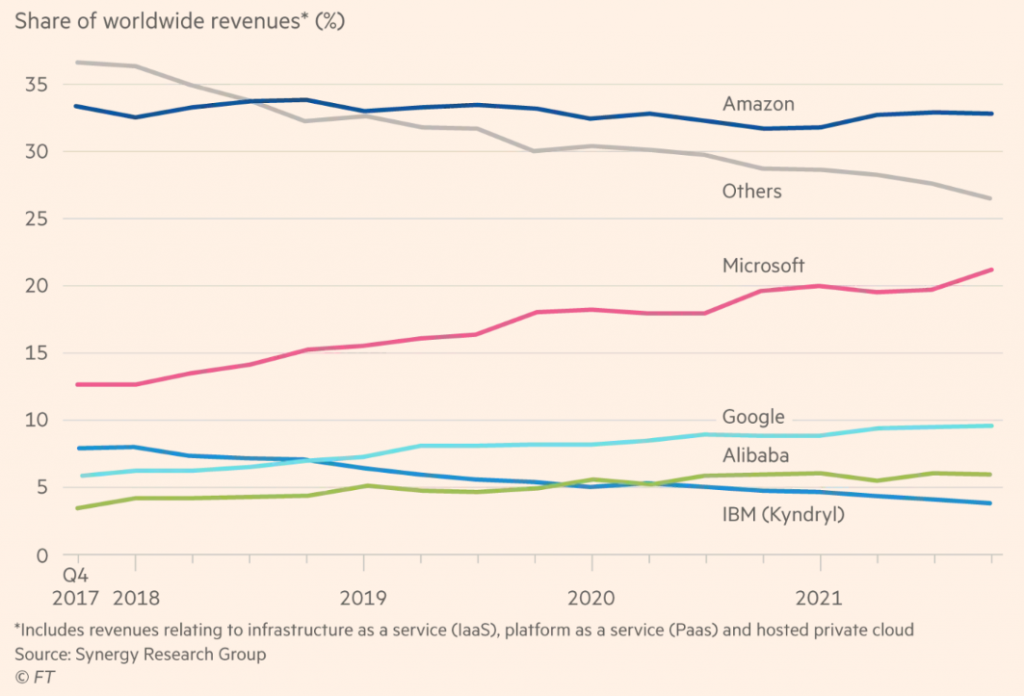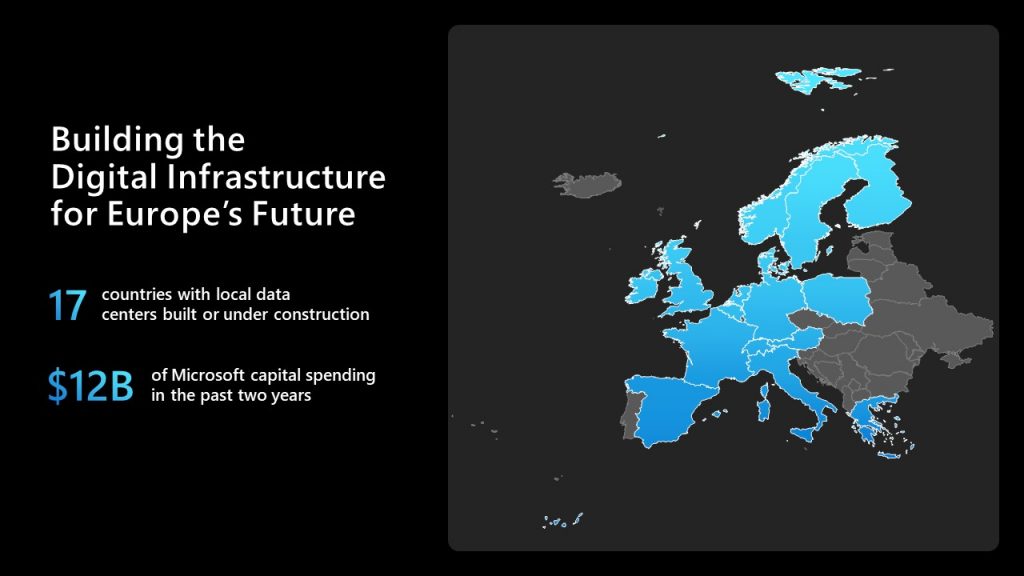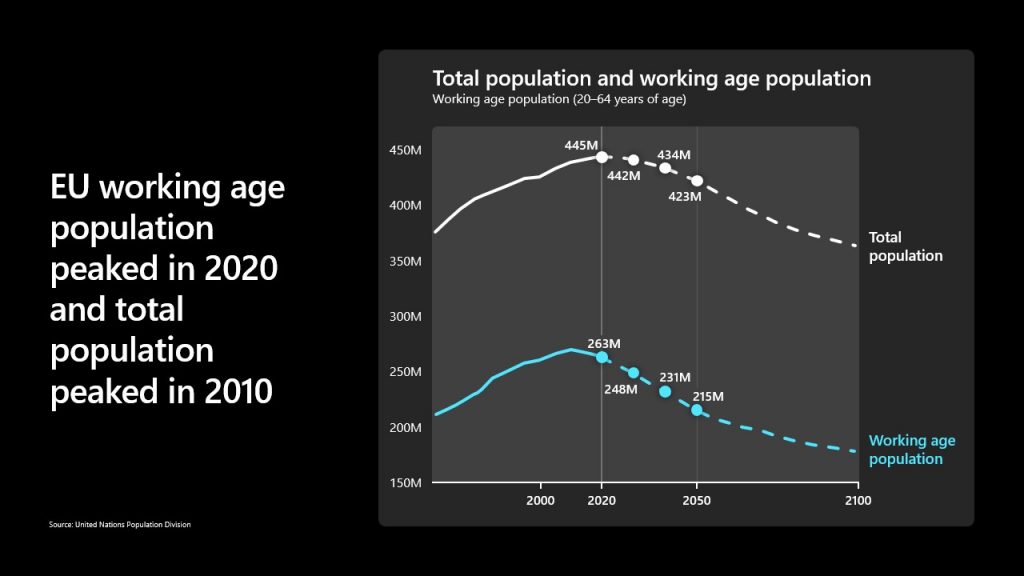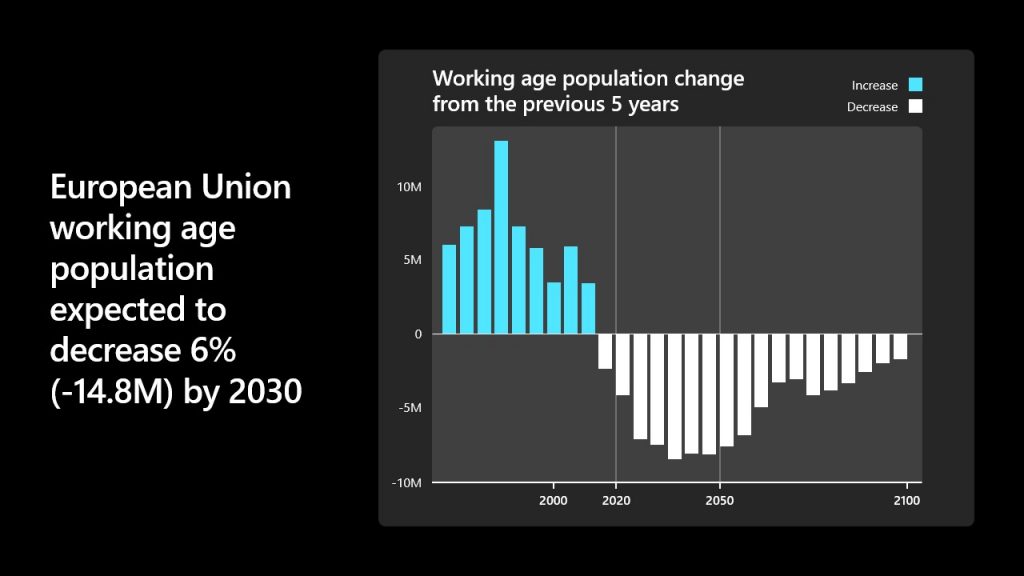You may have read last month in news reports about concerns raised in Europe about some of Microsoft’s software licensing practices that impact competing cloud providers. As I said to journalists then, we felt that “while not all of these claims are valid, some of them are, and we’ll absolutely make changes soon to address them.” As a major technology provider, we recognize our responsibility to support a healthy competitive environment and the role that trusted local providers play in meeting customers’ technology needs. We thought it was important to start taking meaningful action within weeks, rather than months or years, and we set a goal internally to do so by today, a day when I’m in Brussels.
I just finished an event in Brussels where I discussed our changes, and I wanted to share our steps more broadly in this blog. We’re announcing two closely related initiatives today:
- The first is a set of five European Cloud Principles that Microsoft is adopting to run our cloud business across Europe. These principles, shown below and explained later in this blog, will guide all aspects of our cloud business, enhance transparency for the public, and help us to better support Europe’s technology needs.
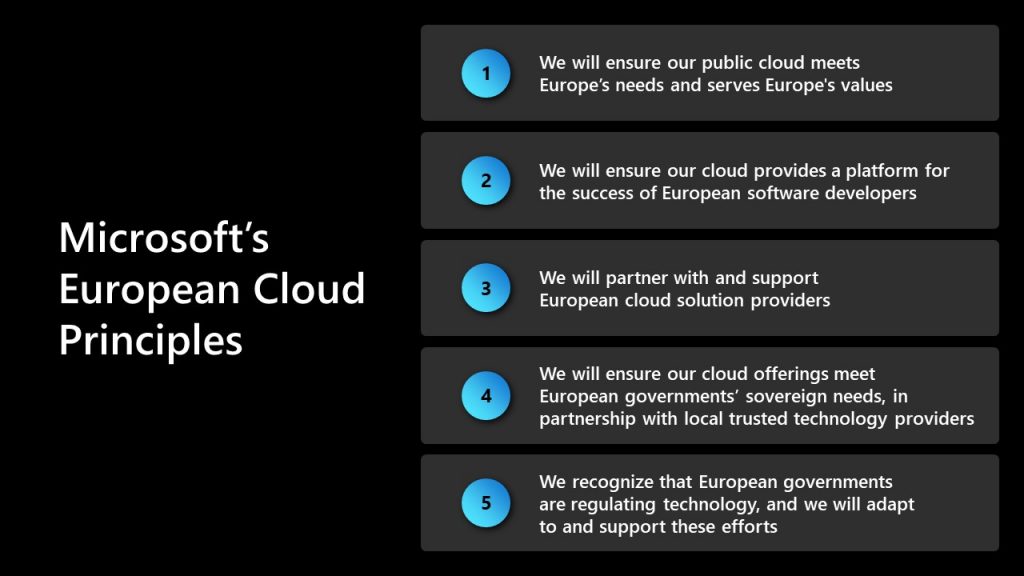
- The second, which implements one of these principles, is a new initiative to support European Cloud Providers so they can more easily host a wider variety of Microsoft products on their cloud infrastructure. This will make European Cloud Providers more competitive by enabling them to better serve customers.
Before turning to the details, I think it’s important at the outset to acknowledge that these steps are very broad but not necessarily exhaustive. As I said in one video meeting a few weeks ago with the CEO of a European cloud provider, our immediate goal is to “turn a long list of issues into a shorter list of issues.” In other words, let’s move rapidly so we can learn quickly. Today we’re taking a big step, but not necessarily the last step we will need to take, and we look forward to continuing feedback from European Cloud Providers, customers, and regulators.
Feedback from European Cloud Providers
The changes we are making today on behalf of European Cloud Providers are grounded in feedback we heard in meetings with several of those providers across Europe. I joined other senior Microsoft business leaders so I could participate myself in remote meetings with the CEOs of two European providers. In recent weeks, we also engaged other business leaders and dispatched a team that met in person with companies and associations in multiple countries.
Some of the most compelling feedback for me personally came from a CEO who said that he felt that he “was a victim of friendly fire in Microsoft’s competition with Amazon.” It was hard to hear this – but he was right. Over the past few years, our focus on competing with the largest technology providers has resulted in us not being as attentive to the impact on our cloud provider partners. We are making changes to remedy this, beginning today.
This feedback captured an important aspect of recent cloud competition, highlighted in the graph below that was published last month in the Financial Times. Microsoft has a healthy number two position when it comes to cloud services, with just over 20 percent market share of global cloud services revenues. We compete every day with Amazon, which has consistently captured roughly 33 percent of those revenues. Google in turn has been growing its share of cloud services revenues and now ranks at number three.
Especially as the largest tech companies have invested more in their infrastructure and services, the biggest challenge has been for smaller cloud providers, like those headquartered in Europe that have expressed concerns about our licensing practices and their ability to compete. While these companies have been growing, it has been at a rate lower than the market as a whole. You can see this in the declining collective market share for smaller cloud providers shown in the graph above.
While a free market and rapid technological change inevitably lead to both new successes and challenges, we recognize that it is important to support a competitive environment in the European cloud provider market, in which smaller competitors have the opportunity to thrive. I personally appreciate the importance of these issues, having spent almost a decade leading Microsoft’s work to resolve its legal issues in the EU, with the last case finalized in 2009. It’s critical for us to remain mindful of our responsibilities as a major technology company, and this has informed the steps we’re announcing today.
Announcing: better support for European Cloud Providers
Today we’re announcing a new initiative to support European Cloud Providers, starting with the expansion of our flagship program: the Microsoft Cloud Solution Provider program. We are creating new benefits for customers that European Cloud Providers can build upon to deliver new solutions to those customers. This initiative will apply across Europe, including the United Kingdom. It will have several pieces, including the highlights described below.
More options for European Cloud Providers. First, we will enable more European companies that host software to join this program and will provide all of them with more opportunities and benefits than before. In short, we will enable and even help European Cloud Providers to host and run Microsoft products on their infrastructure for customers, including products that have traditionally been licensed to run only on a customer’s own desktop or server computers (typically called “on-premises” in the software industry). This will include the following:
- This expansion will enable these cloud providers directly to offer Windows and Office (including Windows 11 and the Microsoft 365 Apps for Business and Enterprise) as part of a complete hosted desktop solution that they can build, sell, and host on their infrastructure. This will mean that European Cloud Providers will have the ability to provide this complete, end-to-end solution to their customers for the first time.
- The expansion will also enable European Cloud Providers to provide this same service to customers who buy Windows and Office software from other Microsoft partners and who may want a European Cloud Provider to host this software for them.
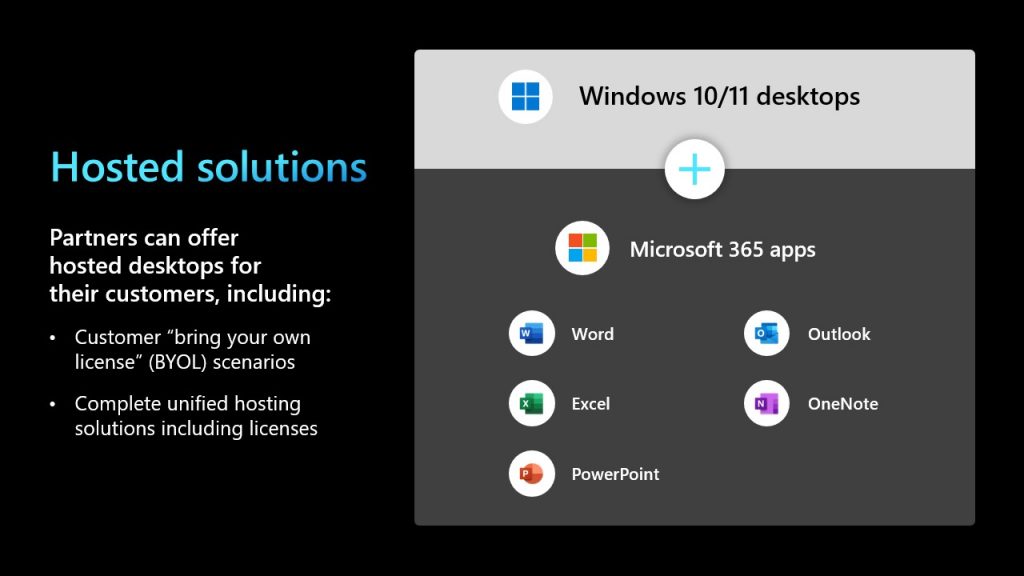
- We are also addressing a pain point we heard from cloud providers by expanding the range of products that can be offered to customers at fixed pricing for longer terms, which will provide more pricing stability and certainty to providers and their customers.
More flexibility for customers. We recognize the importance of coupling the changes for cloud providers with greater licensing flexibility for customers. In recent meetings across Europe, we heard requests to simplify our licensing, and hence we have reviewed and will make changes inspired in part by the Fair Software Licensing Principles created by two prominent European organizations, CIGREF and CISPE, who are focused on Europe-wide issues. While we still have important work to do in drafting and implementing the details, they will include the following:
- We will take to heart the first recommendation in the Fair Software Licensing Principles and will strive to craft revised licensing terms that are more clearly written, better enable customers to readily determine their licensing costs, and permit customers to determine their obligations more easily.
- Several of the Fair Software Licensing Principles relate to how customers can move their licenses to the cloud, leverage shared hardware, and have more flexibility in deployment options for the software they purchase. In support of that, we will revise and expand our Software Assurance program, in which customers purchase new version rights, disaster recovery, failover support, license mobility, and many other benefits. Today, Software Assurance benefits do not include license mobility rights for products such as Windows, Office, or Windows Server, so customers must use that software in more restrictive programs or on hardware dedicated specifically to those customers. We will expand Software Assurance to enable customers to use their licenses on any European Cloud Provider delivering services in their own datacenters, similarly to how they can do so on Azure today, whether the hardware is dedicated or multi-tenant. We will then partner more closely with European cloud hosters so we can make this support experience more seamless for customers.
- We will make it easier than ever to license Windows Server for virtual environments and the cloud by relaxing licensing rules that reflected legacy software licensing practices, where licenses are tied to physical hardware. With the changes we will be making, customers will now be able to buy licenses just for the virtualized compute capacity they need, without needing to count the number of physical cores on which the virtualized environment is hosted.
A new European Cloud Provider support team. To make these changes as effective as possible, we will create a new team that will work directly with European Cloud Providers. This team’s mission will be to help this community achieve its goals, provide licensing and product roadmap support, and continue to support their growth around cloud solutions. This new team will also work to create a tighter feedback loop, enabling European Cloud Providers to share ongoing feedback in real time and ensure that Microsoft is better connected and supporting their needs.
Forging closer partnerships with European Cloud Providers. We are also looking beyond the recent narrower issues and asking how Microsoft can be a better partner and supporter of European Cloud Providers. Technology markets are continuing to change rapidly. We believe that all of us will need to continue to evolve our business to remain successful. We’re therefore interested in identifying new opportunities we can all pursue, including together, to grow our businesses by better supporting customers.
The Microsoft Cloud Solution Provider program, as an example, is intended to enable more economic opportunity for cloud providers than simply reselling our products and services. As customers increasingly look to cloud providers for help to manage their complex environments, the program allows cloud companies to provide a broad range of managed services to help deploy, manage, maintain, and support cloud services. Small and medium-sized enterprises, in particular, need additional managed services like this to make better use of cloud and AI technologies.
We will also create new ways for local cloud providers to work with Microsoft, including a new concrete initiative to serve governments with so-called “sovereign solutions,” described further below. And we will back these efforts with new investments from Microsoft to help accelerate these efforts more quickly.
Announcing: Microsoft’s European Cloud Principles
The focus on European Cloud Providers is part of a broader initiative and set of European Cloud Principles that I shared at the Brussels event today. It sets forth five principles that will guide our cloud business across Europe. These are:
- We will ensure our public cloud meets Europe’s needs and supports Europe’s values.
- We will ensure our cloud provides a platform for the success of European software developers.
- We will partner with and support European Cloud Providers.
- We will provide cloud offerings that meet European government sovereign needs in partnership with local trusted technology providers.
- We recognize that European governments are regulating technology and we will adapt to and support these efforts.
Let me share here a bit more about each of these principles:
We will ensure our public cloud meets Europe’s needs and supports Europe’s values
Most broadly and importantly, we are committed to ensuring that Microsoft’s cloud supports Europe well. We have more than 40 years of experience in Europe, and personally I’m always proud to say that I spent my first three years as a Microsoft employee based in Paris. That was almost 29 years ago.
Our focus here has two parts. The first is a commitment to use Microsoft’s resources to invest in and build a public cloud that will meet Europe’s economic, security, and cultural needs in a deep and forward-looking manner.
We have completed or are now constructing 17 datacenter regions in Europe and are rapidly expanding our footprint across the continent. Since 2020 we have announced plans to build nine new datacenter regions, in Austria, Belgium, Denmark, Finland, Greece, Italy, Poland, Spain, and Sweden (launched last November). During the past two years alone, we have made investments exceeding $12 billion, making Microsoft one of the largest sources of capital for Europe’s technology future.
But it’s not just the large amount we’re spending. It’s how we’re spending it. We’re not trying to replicate all the services that other tech companies offer or enter businesses that compete with our customers.
We focus instead on developing cloud and AI technologies that can augment all the factors of production needed for economic growth. Economists have long recognized that factors of production are the “building blocks of the economy” – they are what people use to produce goods and services. Economists divide the factors of production into four categories: land, labor, capital, and entrepreneurship. While digital technologies of course are products in their own right, we believe our role in the European economy is to create cloud and AI technologies that can be used by any European company, NGO or government as an input to augment every factor of production and help build and enhance its own products or services in the pursuit of growth and prosperity.
This role requires that we understand and connect closely with not just the companies but the communities where we operate. Our decades of local experience and deep customer connections give us many broad insights about local economic needs. This includes enormous appreciation for the leadership of European companies large and small in a wide variety of specialized technical and business domains that are critical to the world’s future. Industries like automobiles, aerospace, chemicals, foods, pharmaceuticals, and many other manufactured goods are all good examples. In so many ways, European products sustain the world and are the backbone of Europe’s own economy.
But we also appreciate that a changing world is creating new challenges for Europe (and indeed every part of the world). Part of this is a new set of challenges for specific companies and industries. The global competitiveness for many European companies in the decade ahead will require the use of cutting-edge cloud and AI services. Our mission is to meet this need.
There’s one additional aspect that is even broader and more important. We’ve reached a demographic turning point in human history that is creating new challenges for the European Union, Japan, and many other industrial countries. It’s not just that populations are getting older. An even broader challenge is that working-age populations are getting smaller. As shown in the graphs below, we’ve entered uncharted demographic territory, as the working-age population (defined as ages 20-64) will shrink in each decade ahead.
This means that many European countries will need to grow their economies and improve prosperity while adapting to a constantly shrinking population of working-age people. The implications of this change are vast and profound. At their core, they mean that growth and prosperity will depend in no small part on better technology inputs such as cloud services and artificial intelligence. Our aim, put simply, is to provide Europe with world-leading, cutting-edge technology that can serve as a foundation for meeting these economic needs.
There is a second dimension as well. We appreciate the critical importance of serving not only Europe’s growth, but Europe’s values. We are grounding our work as a company in four key priorities – support for inclusive growth, the protection of democracy and fundamental rights, trusted technology, and environmental sustainability.
We are backing these goals with concrete measures. For example, we are working to ensure not only that our technologies support every part of the European economy, but also investments in broad skilling initiatives, so people and organizations have the expertise needed to put this technology to effective use. Already, we have reached almost nine million Europeans.
Similarly, as the war in Ukraine has demonstrated, we’re committed to protecting and even defending European democracies with world-leading cybersecurity measures, a topic I’ll address in greater detail tomorrow in London. We’re similarly taking new steps to protect European democracies from foreign nation-state disinformation operations, while providing essential cybersecurity protection for candidates, political parties, and think tanks.
And we continue to expand the work needed to ensure that people can trust the technology they use – through steps like our EU Data Boundary for the Microsoft Cloud – and to help meet ambitious climate goals, as I shared publicly yesterday in Germany. We do all of this with appreciation for Europe’s deep and varied cultures, which have contributed so much to humanity, and which we can use new technology to protect and promote.
We will ensure our cloud provides a platform for the success of European software developers.
The European technology market is of course far broader than the market for cloud infrastructure. The European economy, especially the 22.5 million small and medium-sized enterprises (SMEs) that comprise 99 percent of all companies in Europe, are purchasing more than €50 billion in software applications and services each year. This is projected to grow to €136 billion by 2025, with the most significant growth coming from software as a service (SaaS) providers.
We are committed to supporting the success of European software developers across the full range of these technology markets. Our tools and technology are widely used by European developers, with more than a quarter of active GitHub users and almost nine million developers in Europe using our Visual Studio family of products today.
In addition, we have worked with nearly 50,000 European startups enrolled in our programs to scale up and accelerate their growth, including providing more than $500M in technology benefits and support over the last two years. Our 11 Microsoft Technology Centers across Europe are helping companies explore creative technology solutions to their business challenges – efforts that have been important throughout Microsoft’s four decades presence in Europe and are even more vital today. And they pay concrete economic dividends.
According to a recent IDC study, by 2025, Microsoft’s ecosystem partners in Europe will generate $8.00 of revenue for every dollar of revenue generated by Microsoft itself, up from $6.79 today.[1]
We will partner with and support European Cloud Providers.
Our announcement today is designed not just to address recent and specific issues, but to elevate the importance of our work to partner with and support European Cloud Providers. As we look to the future, we believe that changing technology will create the need for a new generation of managed cloud services that can often best be provided by trusted local providers.
Many customers have outsourced IT services for decades, and these services today involve data that is more sensitive than ever for a business and its customers. While a large tech company like Microsoft can excel at building a public cloud with global efficiencies, scale, and security, that doesn’t necessarily make us the right provider to manage the specialized IT resources and services of every customer. One of our priorities therefore will be to invest in and better partner with local cloud providers across Europe, so we can work together to provide forward-looking managed services that meet evolving customer needs.
We will provide cloud offerings that meet European government sovereign needs in partnership with local trusted technology providers.
We recognize as a company that many European governments want more customized cloud solutions for their sovereign technology scenarios, especially for public sector and certain critical infrastructure providers. Increasingly, European governments are developing data classification regulations so they can treat different categories of data in different ways. This is helping government officials develop a more flexible and nuanced approach that balances the sensitivity, and hence security protection, needed for different data categories with opportunities to combine public and private cybersecurity threat detection, innovate faster, and reduce technology costs. This also reflects the size of different countries and governments, including the size of a government’s intelligence agency that may wish to assume sole and complete cybersecurity responsibilities for data protection.
In short, there’s a rapidly emerging trend across Europe that eschews a one-size-fits-all approach and instead offers national governments more choice and flexibility. As a company, we are committed to meeting this need. Based especially on Microsoft’s recent experience defending Ukraine from Russian military cyberattacks, we recognize both the critical importance of this need and the opportunity to work in ways that provide individual governments with the opportunity to choose how to deploy digital technology to protect sovereign needs.
A critical aspect of our cloud strategy is therefore to work more closely and rely upon trusted local technology partners. We recognize that some governments may want to provide access to some sensitive workloads and data categories only to local providers, secured even from cloud infrastructure providers. Or alternatively, they may want to rely solely upon such a local partner for a subset of data processes or ensure that such a partner can provide oversight of the data flows of the infrastructure provider. Especially because national needs and choices differ, local options and expertise are critical.
Over the past year, we have moved quickly to create more local options for European governments, partnering in each case with a trusted local cloud technology company. For example, in May 2021, we announced a partnership with Leonardo in Italy to provide cyber protection for data and services for strategic data assets linked to the upcoming National Strategic Hub: Polo Strategico Nazionale (PSN). The same month we announced Bleu, a partnership with a French company owned by Orange and Capgemini to provide a “Cloud de Confiance” service to meet sovereignty requirements in France.
We have followed this with two more steps during the past six months. In December 2021, we announced a new partnership in Spain with Telefonica Tech, to offer public sector organizations, including defense and companies in regulated environments, customized infrastructure and cloud computing services. And in February 2022, SAP and Arvato selected Microsoft as their cloud technology partner for a new German company that will provide a sovereign cloud infrastructure for the German public sector.
We’re committed to the continuing evolution of this work, adapting in each country to the national government’s needs and requirements. We see this as another opportunity to partner more closely with European cloud and other technology companies in each country, and we plan to announce further steps in the months ahead.
We recognize that European governments are regulating technology and we will adapt to and support these efforts.
The 2020s are creating a new era for technology. Unlike the last few decades, we’ve entered an era that is characterized by both technology innovation and technology regulation. Like any company, there are days when we read a particular proposal and grimace at what it may involve. But fundamentally, we believe the tech sector needs to mature and adapt to, rather than fight against, a new age of tech regulation.
This is not a small or easy endeavor. As I stated earlier, the next three years will see the realization of the European Commission’s vision for a Digital Europe based in part on the SaaS solutions of tens of thousands of startups and SaaS offerings from European enterprises. In short, cloud service providers of all types must work through how to best meet the obligations of coming regulatory changes. This is not just a European phenomenon; it is a worldwide challenge. Regulatory changes are coming in multiple legal fields and from many countries around the world. In part, because democratic governments have waited so long to regulate digital technology, they understandably feel enormous pressure to catch up quickly. And because the tech sector is so global, no industry has ever had to grapple with so many regulatory changes on such an international basis.
While the tech sector will need to mature and adapt, we also will need to push ourselves to be more transparent and help government officials gain information and insights about what’s needed to enable innovation and regulation to move forward together. One thing I’ve learned first-hand is that it’s often easier to design technology than to build it. And it can be easier to build a technology service than to operate it. This is critical for technology regulation as well. We need technology services and regulations that will work together in practice.
This will require that governments do more to coordinate regulatory initiatives both internally and across borders. At Microsoft, we’re now tracking more than three hundred regulatory proposals in a dozen legal fields from more than one hundred countries. While the European Union is a global leader in tech regulation, gone are the days when the EU could adopt something like GDPR while other governments’ regulatory initiatives were standing still. This creates the need for more discussion and coordination among governments than in the past.
Ultimately, all this will create more opportunities and challenges for everyone involved in the discussions that will shape the future of tech regulation. For me, this is perhaps the most exciting aspect.
The future of technology innovation and regulation will require people who can think creatively. People who think across boundaries. People who can build bridges, not just across countries, but across intellectual fields like engineering, computer science, and the liberal arts. As we advance AI and entrust computers to make decisions that previously could only be made by humans, we will need more people steeped in the humanities and social sciences. We will need to make room at the table for people that represent the world’s great cultures and important religions.
Great technologists will continue to innovate. What we all will need to do together is ensure that technology innovation serves people. In part, this will require thoughtful technology laws and regulation. And these can only come from thoughtful people who are committed to listening and learning together. At Microsoft, we’re excited to be part of these conversations, and we’re committed to contributing constructively to their success.
[1] IDC Info Snapshot, sponsored by Microsoft, The Microsoft Cloud Dividend Snapshot: Europe, Doc. #US49115022, May 2022.


